

The Nature of Consciousness (Session 1, Allan Watts Lectures) Logic (philosophy) Philosophy of language. Intelligence Forms. "Discovery is the ability to be puzzled... - Noam Chomsky Quotes. Noam Chomsky "On The Philosophy Of Mind" English honorifics. In the English language, an English honorific is a title prefixing a person's name, e.g.: Miss, Ms, Mr, Sir, Mrs, Dr, Lady or Lord.

[citation needed] They are not necessarily titles or positions that can appear without the person's name,[citation needed] as in the President or the Earl. Chinese honorifics. Chinese honorifics were developed due to class consciousness and Confucian principles of order and respect in Ancient and Imperial China.

The Chinese polite language also affects Japanese honorifics conceptually; both emphasized the idea of classes and in-group vs. out-group. So the language used among friends would be very different from that used among businesspeople. Although most Chinese honorifics have fallen out of use since the end of Imperial China, they can still be understood by most contemporary Chinese speakers. This is partly attributable to the popularity of Chinese historical novels and television dramas, which often employ language from the classical periods. In general, language referring to oneself exhibits self-deprecating humbleness, while language referring to others shows approval and respect.
Example[edit] Ethnoscience. Ethnoscience has been defined as an attempt "to reconstitute what serves as science for others, their practices of looking after themselves and their bodies, their botanical knowledge, but also their forms of classification, of making connections, etc.

" (Augé, 1999: 118). Origins of Ethnoscience[edit] Ethnoscience’s focus was not always different from the ideas of “cognitive anthropology”, “component analysis,” or “the New Ethnography”; it is a specialization of indigenous knowledge systems, such as Ethno-botany, ethno-zoology, ethno-medicine, etc. (Atran, 1991: 595)”. According to Scott Atran, ethnoscience looks at culture with a scientific perspective (1991: 650), although most anthropologists abhor this definition. Davidson, Donald (1986). "A Nice Derangement of Epitaphs" Malapropism. The word malapropism comes ultimately from the French mal à propos meaning "inappropriate" via "Mrs.

Malaprop", a character in the Richard Brinsley Sheridan comedy The Rivals (1775) who habitually misused her words.[2] Dogberryism comes from "Officer Dogberry", the name of a character in the William Shakespeare play Much Ado About Nothing. These are the two best-known fictional characters who made this kind of error—there are many other examples. Malapropisms also occur as errors in natural speech. Malapropisms are often the subject of media attention, especially when made by politicians or other prominent individuals.
Etymology[edit] The word "malapropism" (and its earlier variant, "malaprop") comes from a character named "Mrs. The synonymous term "Dogberryism" comes from the 1598 Shakespearean play Much Ado About Nothing, in which the character Dogberry utters many malapropisms to humorous effect.[5][6] Distinguishing features[edit] Examples from fiction[edit] The fictional Mrs. Causal theory of reference. A causal theory of reference is a theory of how terms acquire specific referents.
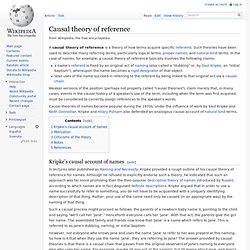
Such theories have been used to describe many referring terms, particularly logical terms, proper names, and natural kind terms. Reference. First published Mon Jan 20, 2003; substantive revision Wed May 20, 2009 Reference is a relation that obtains between expressions and what speakers use expressions to talk about.
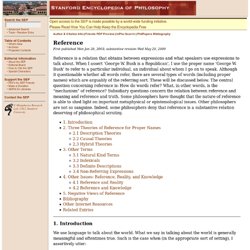
When I assert ‘George W. Bush is a Republican’, I use the proper name ‘George W. Bush’ to refer to a particular individual, an individual about whom I go on to speak. Although it questionable whether all words refer, there are several types of words (including proper names) which are arguably of the referring sort. Direct reference theory. In the 19th century, mathematician and philosopher Gottlob Frege argued against it, and contrasted it with mediated reference theory.[5] In 1953, with his Philosophical Investigations, Wittgenstein argued against referentialism, famously saying that "the meaning of a word is its use.
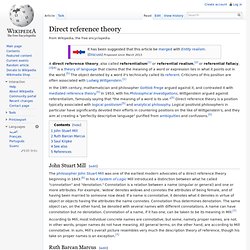
"[5] Direct reference theory is a position typically associated with logical positivism[5] and analytical philosophy. Theory of descriptions. The theory of descriptions is the philosopher Bertrand Russell's most significant contribution to the philosophy of language.
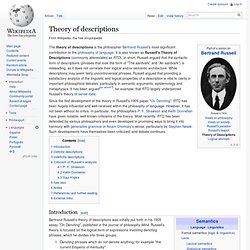
It is also known as Russell's Theory of Descriptions (commonly abbreviated as RTD). In short, Russell argued that the syntactic form of descriptions (phrases that took the form of "The aardvark" and "An aardvark") is misleading, as it does not correlate their logical and/or semantic architecture. On Denoting. In the 1920s, Frank P.
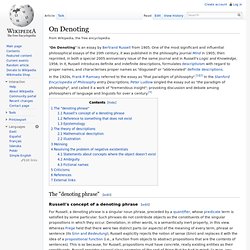
Ramsey referred to the essay as "that paradigm of philosophy".[1][2] In the Stanford Encyclopedia of Philosophy entry Descriptions, Peter Ludlow singled the essay out as "the paradigm of philosophy", and called it a work of "tremendous insight"; provoking discussion and debate among philosophers of language and linguists for over a century.[3] The "denoting phrase"[edit] Russell's concept of a denoting phrase[edit] Reference to something that does not exist[edit] Internalism and externalism. Internalism and externalism are two opposing ways of explaining various subjects in several areas of philosophy.
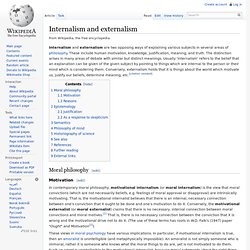
These include human motivation, knowledge, justification, meaning, and truth. The distinction arises in many areas of debate with similar but distinct meanings. Usually 'internalism' refers to the belief that an explanation can be given of the given subject by pointing to things which are internal to the person or their mind which is considering them. Conversely, externalism holds that it is things about the world which motivate us, justify our beliefs, determine meaning, etc.
Internalism and externalism. Externalism. Mental status examination. Narrow Mental Content. First published Wed Nov 20, 2002; substantive revision Thu Jun 30, 2011 Narrow mental content is a kind of mental content that does not depend on an individual's environment. Narrow content contrasts with “broad” or “wide” content, which depends on features of the individual's environment as well as on features of the individual. It is controversial whether there is any such thing as narrow content.
Assuming that there is, it is also controversial what sort of content it is, what its relation to ordinary or “broad” content is, and how it is determined by the individual's intrinsic properties. 1. Externalism About Mental Content. First published Mon Oct 21, 2002; substantive revision Wed Jan 22, 2014 Many of our mental states such as beliefs and desires are intentional mental states, or mental states with content. Externalism with regard to mental content says that in order to have certain types of intentional mental states (e.g. beliefs), it is necessary to be related to the environment in the right way.
Internalism (or individualism) denies this, and it affirms that having those intentional mental states depends solely on our intrinsic properties. This debate has important consequences with regard to philosophical and empirical theories of the mind, and the role of social institutions and the physical environment in constituting the mind. It also raises other interesting questions concerning such matters as the explanatory relevance of content and the possibility of a priori self-knowledge. The Meaning of Meaning. Ogden Triangle of reference (aka Semantic Triangle). Figure taken from page 11, The Meaning of Meaning subtitled A Study of the Influence of Language upon Thought and of the Science of Symbolism. The Meaning of Meaning: A Study of the Influence of Language upon Thought and of the Science of Symbolism (1923) is a book by C.
Theories of Meaning. Causal Theories of Mental Content. Intelegence & mind. Psychology. Artificial Intelligence. AI Philpsophy (drafts)